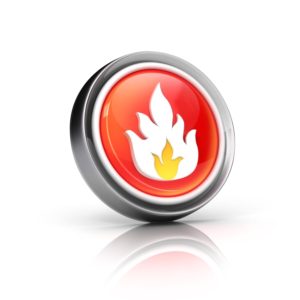
- How To Use A Fire Extinguisher
- Fire Extinguisher Inspection
- Natural Gas Detectors
- Fire Extinguisher Refills
- Elide Fire Extinguisher Ball
- Carbon Monoxide Detector Beeping
- How To Put Out An Electrical Fire
- Carbon Monoxide Detector Placement
- Fire Resistant Paint
- Hard Wired Smoke Detector Beeping
- Proper Fire Blanket Usage
- Changing Batteries In Smoke Alarm
- Smoke Detector Tester
- Smoke Detector Installation
- Do Fire Extinguishers Expire
- How Long Do Smoke Detectors Last
- Fireproof Document Bags
- Fire Safety In The Workplace
- Carbon Monoxide Detectors For Travel
- Car Fire Extinguishers
- How Hot Is Fire?
- Class K Fires
- Fire Extinguisher Colours
- Class D Fires
- Fire Extinguisher Training
Hotel Fire Safety – Hotels like to bill themselves as a home away from home for their guests. They want to offer all the amenities you have at home like internet access, a nice TV, clean bathroom facilities, and a comfortable bed. They may provide a continental breakfast or even room service to take care of your dietary needs, or they could have an in-room kitchenette to help you prepare your own home-cooked meals. Many hotels do a great job of assembling a like-home experience.
This site is a participant in the Amazon Services LLC Associates Program, an affiliate advertising program designed to provide a means for sites to earn advertising fees by advertising and linking to Amazon.com. Amazon, the Amazon logo, Amazon Supply, and the Amazon Supply logo are trademarks of Amazon.com, Inc. or its affiliates.
Of course, your hotel room features some of the same dangers that you have at home. You can slip on the bathroom floor, trip over your shoes, or even just oversleep in a hotel room just like you can at home. Most importantly, you can also face the danger of a fire when you’re staying in a hotel. Click here for the Best-Selling Fire Safety Products.
Fires in hotels are exceedingly rare, thanks to the stringent formulation and enforcement of fire codes. Modern hotels are built out of fire-resistant materials, and they feature full-building alarm and sprinkler systems as well as numerous fire extinguishers throughout the facility.
Regardless of their level of preparedness, you should assume that you are responsible for your own safety if a fire breaks out in your hotel. Here are six tips for making your hotel experience just as safe as a night spent at home.
When you checked in, the directions to your room provided by the clerk probably sounded a little complicated. After you went to the elevator on the left, took it to the third floor, and turned right twice, you might have just given up and relied on the directional signs on the wall.
That works fine when you’re wide awake and the hall is fully lit. Things may be very different when there’s a fire. You’re awakened by the fire alarm at 3:00am, not even sure of where you are for a minute. Then you have to get everyone else in the room to wake up and into the hall. Smoke, darkness, and other fleeing guests will make your exit more difficult than your arrival.
Prepare for this ahead of time. Once you’ve unloaded everything in your room, review your path out of the hotel, as indicated on the escape plan by your door. Find the closest exit, then the second closest. See if there are any obstructions like luggage carts that have accumulated in the path, and notify the front desk if you find any. Check how to open the window or balcony door as a final option.
Know Where You Are
With cell phones everywhere, people who witness emergencies often assume that someone else is calling for help. That’s usually right, but there have been many instances in which everyone made that assumption and nobody actually called for help. Even if your hotel’s alarm activates, call the fire department. You may be able to provide details about the location of the fire that could save them time finding it.
Of course, the most important thing to know when you call 911 is where you are. Even if you have stayed in the same hotel many times, you may not know what its address is. During check-in, take note of the street address of your hotel. Make sure that you keep that information with your room number near the phone. You’d be surprised how quickly you can forget even a familiar address when there is a fire.
Remember that your room number isn’t necessarily enough to guide firefighters to you if you need rescue. From the outside, they don’t know which side of the building you’re on. Varying contours of the land around the hotel can even distort floor numbers. Be prepared to give a description of where an outside viewer can find your room.
Obey the Alarm
Fire alarms are complicated, expensive equipment that has been carefully designed to notify occupants as quickly as possible when there is a fire. They typically experience very few false activations. Unfortunately, many people ignore fire alarms, blaming past experiences for their complacency. The consequences are often fatal.
Despite the midnight disturbances you’ve previously suffered in other hotels or maybe a college dorm, you should always evacuate when the alarm sounds. Most modern alarm systems today are extremely effective. They’ve even been upgraded to distinguish smoke from steam so that they don’t create as many false alarms.
If there really is a fire, you’ll be glad you left immediately. If there is not, the hotel staff or the fire department will figure it out quickly and get you back to your room as soon as possible. Either way, you’re not putting much on the line to react and be better safe than sorry.
Escape Wisely
Of course, it’s not enough just to know when it’s time to leave the building. There is a right way and a wrong way to exit a building during a fire. If you choose the wrong way, you can endanger yourself, your family, and others in the building.
The most important thing is not to run. Everyone understands that a fire is a frightening situation, but running is not safe. If you run, you are more likely to trip and fall. This could leave you injured and possibly make you an obstruction to others who are attempting to escape. Panicked crowds running for the exits have caused many deaths in some of history’s most tragic fires, so remain calm and walk to the exits.
If smoke is present, even walking won’t be possible. You’ll want to hit your hands and knees and crawl below the smoke. In this situation, exit signs won’t be visible. That’s why it’s critical to familiarize yourself with exits when you first arrive.
Take nothing with you. Make sure all the room’s occupants are with you, but leave everything else behind. If your door is closed, all your belongings will be safe from the fire until it has been extinguished and you are allowed to return. The time lost gathering even “just the essentials” can dramatically lower your odds of getting out of the building in time.
Avoid Elevators
It’s also critical that you never use the elevator to escape during a fire. If your mobility is impaired in such a way that you would have no choice, request a first-floor room when you make your reservation. An elevator presents a number of dangers.
The growth of the fire makes the elevator a bad choice. First, the power to the elevator can fail as the fire begins tripping breakers or impacting electrical service to the building. This will leave you stuck in the elevator as the fire progresses, trapped in the path of the smoke.
Second, the clean air in the elevator could become replaced by smoke if the elevator opens on the floor where the fire is burning. You cannot control where the elevator stops, so you may find your doors opening on a smoky floor where others are attempting to escape.
Finally, panicked guests may overfill the elevator, exceeding its weight capacity and leaving it stuck between floors. Many fire deaths in large buildings like hotels are a result of overcrowded groups of frightened people, and an elevator that is stuffed full of people is a perfect example.
How to React If You Can’t Escape
Before you walk or crawl from your room, you should feel the doorknob for heat. Use the back of your hand; if it’s hot, your reflexes will cause your hand to grab the handle if you test it with your palm. A hot knob is all the reason you need to stay where you are and wait for help.
Don’t panic. Your room will be very safe with a few simple steps. Use towels, blankets, or sheets to fill the gap below the door. If your room joins another, be sure to seal that doorway as well. Call 911 next. Give them the name of the hotel, its address, and your room number, along with the exterior description we discussed earlier. Tell them your door was hot and you have stayed in your room.
Once you’ve called help, open a window. Use a sheet or just your arms to signal to anyone outside. If there is smoke outside your window, hang a sheet from it and close it back. Emergency crews will follow up on your improvised flag as quickly as possible.
Fires in hotels have created some tragic outcomes in years gone by. The legacy of those events has been the improvements made to regulations, construction methods, and fire protection systems. When those upgrades are combined with common sense actions by hotel guests, there’s no reason for us to repeat history.
From the moment you check in at a hotel, keep fire safety on your mind. You’ll be prepared to escape safely in the unlikely event of a fire, keeping you safe in your home away from home.
- https://homesafetydot.com/fire-safety/
- https://homesafetydot.com/article-sitemap-1-61cc84/
- https://homesafetydot.com/article-sitemap-2-de7bff/
- https://homesafetydot.com/article-sitemap-3-eb4e4a/
- https://homesafetydot.com/article-sitemap-4-e75eb4/









